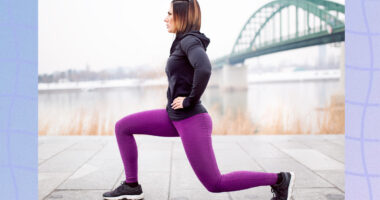
With the events of the last few years, it’s safe to say we’re all as stressed as ever. Deep breathing exercises are commonly recommended for achieving calmness and relaxation, and they’re one of the simplest things you can do to make a world of difference. Yes, we’re saying that simply breathing can help you feel less stressed sometimes.
Breathing slowly and focusing on each breath allows you to be more present and mindful, E. Fiona Bailey, PhD, professor in the department of physiology at the University of Arizona College of Medicine, tells SELF. This, in turn, helps reign in racing thoughts and can sometimes be enough to distract you from the things that are making you worried or anxious.
“Slower, deeper breathing, in which you focus on the time that it takes to breathe in and out, is going to be beneficial for your overall health, costs nothing to implement, and can be done with most people being unaware that you’re changing or regulating your breath,” Dr. Bailey adds. That’s one of the reasons why deep breathing exercises for anxiety can be so powerful.
So, what does ‘deep breathing’ actually mean? Breathing deeply means taking a breath so intentional and big that you feel it all the way into the bottom of your lungs and the diaphragm, the chest muscle that sits right under the ribs.
If you’re breathing deeply, you should be able to feel your entire abdomen expand and watch your belly fill and empty as air moves in and out of your lungs, Gauri Khurana, MD, a psychiatrist in the New York City area, tells SELF.
READ RELATED: Crohn’s disease symptoms: Five 'main' signs of the bowel disease
Try it out: Put on some comfortable clothes, lie on your back, and place one hand on your abdomen. Now, take a deep breath in and out, feeling your stomach rise as you breathe in and fall as you breathe out. “The diaphragm above the stomach is actually the part of the body that is filling and emptying, and the stomach reflects if the diaphragm is full of air or not,” Dr. Khurana says.
When breathing deeply, you’ll take fewer breaths per minute and take in more air with each breath, Dr. Bailey says. “Deep breathing requires more time for each breath, so you’re going to slow down your breathing rate, meaning you’re going to breathe less frequently, and the volume of air that you take in with each breath is going to be greater than what it is at rest.”
What are the benefits of deep breathing?
Deep breathing can help guide you to a state of relaxation, and it’s believed to aid in a wide range of conditions, from anxiety and hypertension to insomnia, pain relief, and post-exercise recovery, Dr. Khurana says.
As SELF previously reported, anxiety, fear, and worry prompt the sympathetic nervous system, which controls involuntary processes like your breathing and heart rate, to kick into high gear. This leads to the release of stress hormones, including adrenaline and cortisol, which ultimately lead to the physical symptoms of anxiety (like a racing heart rate and heavy breathing).
Source: SELF







